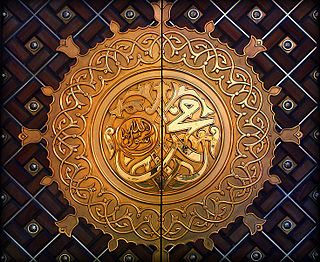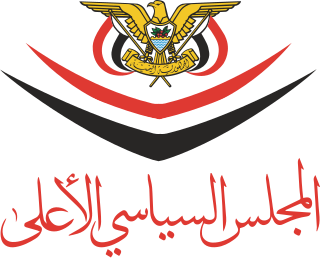Mohammed V University is a public university in Rabat, Morocco. It was founded in 1957 under a royal decree (Dahir). It is the first modern university in Morocco after the University of al-Qarawiyyin in Fez. It is named after Mohammed V of Morocco.

Muhammad, also spelled Muhammed, Muhamad, Mohammad, Mohammed, Mahammad, Maxammed, Mehemmed, Mohamad, Mohamed, or in a variety of other ways, is an Arabic given male name meaning 'praiseworthy'. The name comes from the passive participle of the Arabic verb ḥammada (حَمَّدَ), meaning 'to praise', which itself comes from the triconsonantal Semitic root Ḥ-M-D. Believed to be the most popular name in the world, by 2014 it was estimated to have been given to 150 million men and boys.

Qatar and the United States are strategic allies. Qatar has been designated a major non-NATO ally by the United States.

The Iranian Gendarmerie, also called the Government Gendarmerie, was the first rural police force, and subsequent modern highway patrol, in Iran. A paramilitary force, it also played a significant part in politics from its establishment in 1910 during the Qajar era until the advent of the Pahlavi era in 1925. It continued to serve until the end of the Pahlavi era and was modernized into the Imperial Iranian Gendarmerie. Originally established as a constitutional army, the force employed Swedish officers in command of Iranian personnel to perform both traditional police duties and conduct military campaigns against tribal forces. In 1991 the Iranian Gendarmerie was merged with other police forces to form the Law Enforcement Command of the Islamic Republic of Iran.
Sir George Humphrey Middleton was a British diplomat.
Mohammad-Taqi, also spelled as Muhammad Taqi or Mohammad Taghi is a common name among Muslims, specially Shia Muslims. It may refer to the following:

Syria–United Arab Emirates relations refer to the relationship between the United Arab Emirates (UAE) and the Syrian Arab Republic. The UAE has an embassy in Damascus and Syria has an embassy in Abu Dhabi and a consulate-general in Dubai. Both countries are members of the Arab League, part of the Middle East region and share close cultural ties.

Nuwaidrat is a village located in Bahrain, close to Sitra; it was formerly part of the Sitra Municipality.

Iran and Saudi Arabia are engaged in an ongoing struggle for influence in the Middle East and other regions of the Muslim world. The two countries have provided varying degrees of support to opposing sides in nearby conflicts, including the civil wars in Syria and Yemen; and disputes in Bahrain, Lebanon, Qatar, and Iraq. The struggle also extends to disputes or broader competition in other countries globally including in West, North and East Africa, South, Central, Southeast Asia, the Balkans, and the Caucasus.

The Supreme Political Council is an executive body formed by the Houthi movement and the pro-Houthi faction of the General People's Congress (GPC) to rule Yemen. Formed on 28 July 2016, the presidential council consists of thirteen members and was headed by Saleh Ali al-Sammad as president until he was killed by a drone strike on 19 April 2018, with Qassem Labozah as vice-president. Presently the council is headed by Mahdi al-Mashat as Chairman.

Bilateral relations exist between the countries of Bahrain and Iran. Since the 1979 Iranian Revolution, relations between the two countries have been strained over various geopolitical issues such as the interpretations of Islam, Awakening of the Islamic world, and relations with the United States, Europe, and other Western countries. In addition, Iran has been severely critical of Bahrain for hosting the United States Fifth Fleet within the Persian Gulf at the Naval Support Activity Bahrain base.
The Qatar diplomatic crisis was a high-profile incident involving the deterioration of ties between Qatar and the Arab League between 2017 and 2021. It began when Saudi Arabia, the United Arab Emirates, Bahrain, and Egypt simultaneously severed their bilateral relations with Qatar and subsequently banned Qatar-registered aircraft and Qatari ships from utilizing their sovereign territory by air, land, and sea; this involved the Saudis' closure of Qatar's only land crossing, initiating a de facto blockade of the country. Tensions between the two sides came to a close in January 2021, following a resolution between the Saudis and the Qataris.

The Kingdom of Morocco and the State of Qatar formed diplomatic relations in 1972. There is substantial economic cooperation between the two countries, with Qatar being one of the largest foreign investors in Morocco. A $2 billion joint venture between Qatar's sovereign wealth fund and Morocco was established in 2011.

The Qatar–Saudi Arabia diplomatic conflict refers to the ongoing struggle for regional influence between Qatar and the Kingdom of Saudi Arabia (KSA), both of which are members of the Gulf Cooperation Council (GCC). It is sometimes called the New Arab Cold War. Bilateral relations have been especially strained since the beginning of the Arab Spring, that left a power vacuum both states sought to fill, with Qatar being supportive of the revolutionary wave and Saudi Arabia opposing it. Both states are allies of the United States, and have avoided direct conflict with one another.

Jordan and Morocco share a close relationship as both Jordan and Morocco are Arab countries. Both Jordan and Morocco share common royal relationship, Jordan is led by the Hashemites and Morocco is led by the Alaouites; and are perceived among the most liberal Kingdoms in the MENA. Jordan has an embassy in Rabat and Morocco has an embassy in Amman.











